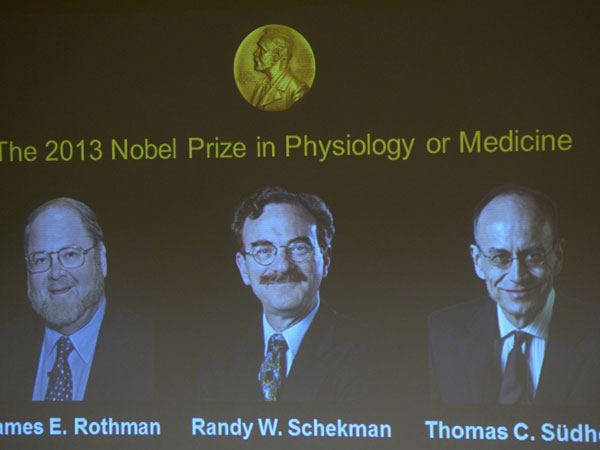
Images of James Rothman and Randy Schekman, of the US, and German-born researcher Thomas Suedhof are projected on a screen, in Stockholm, Sweden, Monday, Oct. 7, 2013, after they were announced as the winners of the 2013 Nobel Prize in medicine. The winners on Monday said scientific progress in the United States is in peril due to unprecedented funding cuts and ideological challenges. AP
WASHINGTON—Three American winners of the Nobel Prize for Medicine on Monday said scientific progress in the United States is in peril due to unprecedented funding cuts and ideological challenges.
The scientists were honored for their work on how cells organize their cargo and move molecules—a process that contributes to normal body and brain function but is also at the root of neurological diseases, diabetes, and immune disorders.
But after they recounted their anecdotes of shock and amazement—including the German-born neuroscientist Thomas Suedhof who admitted he was “a bit lost” driving around in Spain when he got the call with the news—their speeches turned to a future that may hold fewer opportunities.
Co-winner James Rothman, 63, of Yale University, who studies how cells transport energy outside of themselves, said he was struck by how hard it is to get research funding these days.
“It is much, much more difficult… for a young scientist to get started today,” he told reporters, describing a shrinking budget for the National Institutes of Health, the largest funder of US research.
The NIH pays out about $31 billion per year, more than any other government gives to researchers, but budget constraints have kept funding flat for the past several years, meaning even less money when adjusted for inflation.
NIH officials say that competition has also increased for grants, leaving about 16-17 percent of applications funded, far short of the target of 30 percent.
Funding a concern even before budget cut
Rothman said he was concerned about funding long before the budget cuts brought on by the recent sequester, or the current shutdown of the federal government by Republicans opposed to President Barack Obama’s health care reform.
Reflecting on his own beginnings as a scientist, Rothman wondered aloud if he would have been able to make the same strides under the present circumstances.
“I really am very concerned that I would not have been,” he said.
“I see today the kind of enormous opportunities and yet the discouragement that young scientists in this country feel and it is something we need to pay attention to if we want to maintain this country as the great competitive world leader that it has been.”
Rothman praised his co-laureates as men whose work had at times been “complementary, and sometimes competitive.”
Rothman’s co-winner Suedhof, 57, whose lab is at Stanford University, focuses on how synapses form in the brain and how messages get sent, with a view to unlocking the mysteries of Alzheimer’s disease and autism.
“It seems to me there is a significant increasingly vocal percentage of the population that thinks we shouldn’t go after truth and truth is not important. And so that worries the hell out me,” said Suedhof, who is an American citizen.
Funding is “in danger,” leaving enormous hurdles to overcome in solving the main mysteries of the brain, he said.
Biggest problem
But he described the biggest problem as “this cognitive dissonance” in America. “You can’t at the same time be for science and against it,” he said.
“I would consider it as progress if everybody, no matter what their ideology or religion is, could agree on the principle that truth is not an ideological issue.”
The third co-winner, Randy Schekman of the University of California, Berkeley, recalled his humble beginnings, including getting turned down for research funding early on, and how US government support later became “an enormous benefit.”
He also said he was able to work his way through university despite coming from a middle-class family and being one of five children.
“I could work a summer job and pay for the entire school year,” Schekman said, recalling that his tuition in 1966 was $40 a term and room and board cost $400.
“Unfortunately as you know this is no longer true. Tuition fees… have escalated dramatically.”
Schekman, 64, is best known for his work on cell organization in yeast and for identifying three classes of genes that control different parts of the cell transport system.
Rudy Tanzi, a professor of neurology at Harvard University, told AFP that he sees many American science majors head for high-paying consulting jobs rather than academia.
“Because federal funding is so weak we are now in jeopardy of losing a generation or two of American scientists,” said Tanzi, who has collaborated with both Suedhof and Schekman.
“The reason is job security. They are afraid to embark on a future that relies on unstable funding,” he added.
“Most of the PhDs we see coming in are from other countries.”— Kerry Sheridan

